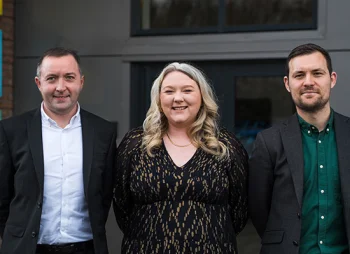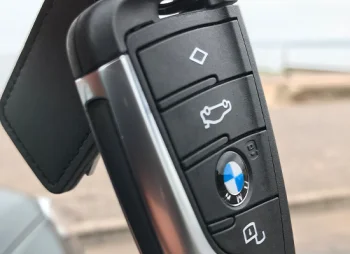With over a decade of experience in the industry, there’s not much Paula doesn’t know when it comes to the corporate fleet world.
After starting her career in the finance and dealer side of the industry, Paula made the switch to Carparison 10 months ago, and has since built up the Corparison side of the business from scratch. There would be no corporate department without Paula at the helm, bringing her wealth of knowledge and industry experience to the job.
We sat down with Paula to find out more about what she does, how she got here, and what changes she would like to see in the industry.
What do you do?
Essentially, I look after the corporate department in its entirety, from small to large fleets.
Before I came along, Carparison didn’t have a corporate arm, so I’ve spent the last ten months working on getting the right partners in place and getting us to where we have a unique offering compared to a single lease company, because we have a mass of funders and can do cross-comparisons.
My job has really been just that: getting all the different elements in place so that when we launched Corparison, we had a complete fleet management offering and could say that we can do everything that a lease company can do, but with a twist.
The difference with Corparison is that I want us to be consultative with customers – a lot of companies seem to be becoming ‘self-serve’ and don’t pick up the phone. But that’s not what we’re about, and that’s not what I want my department to be.
If someone needs help, we’re straight on the phone and getting to the heart of the problem. If someone wants an electric vehicle, we’re not just selling them on the WLTP figures, but actually on whether it would work for them in the real world.
I want us to be telling people those things that will make a difference to their daily lives, rather than clicking a button and factory ordering a car. If we can get you something quicker, we will.
I think we’ll win a lot of business just by being customer focused.
How did you get into the motor industry?
I’ve been working in the industry on and off for around fourteen years.
I came from a banking background and went to work for one of the finance companies when Personal Contract Hire was still in its infancy. I worked there for four years selling personal lease deals to customers, and really enjoyed it.
But after having a baby and running my own business for a few years, I came back and went ‘what next?’.
After a short stint in construction, I came back into cars and worked as a Local Business Development Manager for a company near Ascot. That’s where I found my niche, and realised what I’m really good at is opening large corporate doors and talking to people.
I knew that I wanted to switch and work for a broker though, because I had a dealer background and could see where doors were being shut and opportunities lost. And though there are challenges with being a broker, because you’re coming from more of a middle-man position, there is a scope to offer a lot more than a single funder can.
We might not be able to challenge the big leasing companies with massive fleets just yet, but with our mass of funders and manufacturers, I knew there were doors we can open.
And that’s when I started at Corparison – and it’s the best move I’ve ever made.
What challenges have you faced?
Though I’ve never really felt discriminated against being a woman in the automotive industry, I’ve definitely seen change and it has been very male-dominated throughout my career.
When I started at the finance company, I was the only woman they’d ever employed in that department – and within four months I was the top salesperson and continued to be top throughout my four years there.
I found that sometimes people wanted to talk to a woman – unlike some of the other salespeople, I wasn’t there to talk ‘car’ in detail and talk them out of a car they wanted.
If someone rang to lease a VW Polo, I’d get them a VW Polo.
Being in a male-dominated environment doesn’t bother me as long as I’m treated as an equal, which wasn’t always the case when I spent some time working in construction and couldn’t progress to higher roles.
How can we encourage more women into senior leadership roles?
I think you have to believe in yourself, and you have to encourage people.
As someone who manages people now, I always encourage someone to progress because you don’t know what you’re capable of until you try. And sometimes it takes someone else to see it before you can.
I don’t think being a woman should hold you back. In fact, I think it should make you want to do something more. If someone thinks I can’t do something because I’m a woman, I’ll go and do it anyway.
But for me, it’s definitely about encouragement and getting people to look at themselves and ask themselves why don’t they think they can do something, and why don’t they want to take the next step up. I also think more women in senior leadership roles actually encourage the younger women in offices.
So, the more women in leadership roles, the better.
What’s the most important piece of advice you’ve ever been given?
Treat people how you want to be treated.
And I absolutely believe that. Whether it’s with customers, with people who work for me or with other colleagues. I would never treat someone how I wouldn’t want to be treated, and I think it stands you in good stead and people will come back to you because you’re genuine.
It also helps with colleagues, because people are more likely to help you out if you ask in the right way.
What change would you like to see?
I would just like to see more women.
Sometimes you see pictures of meetings on social media, and it’s just a table full of men. I would like more women to realise that you don’t have to be interested in cars to work in the automotive industry, because it’s not just about the cars.
It’s about people, or the finance products, or fleet management – it’s bigger than just the vehicles.
I would like more women to have their eyes opened to what a career in the automotive world can be, and not to be discouraged because it can still be quite male-dominated.




